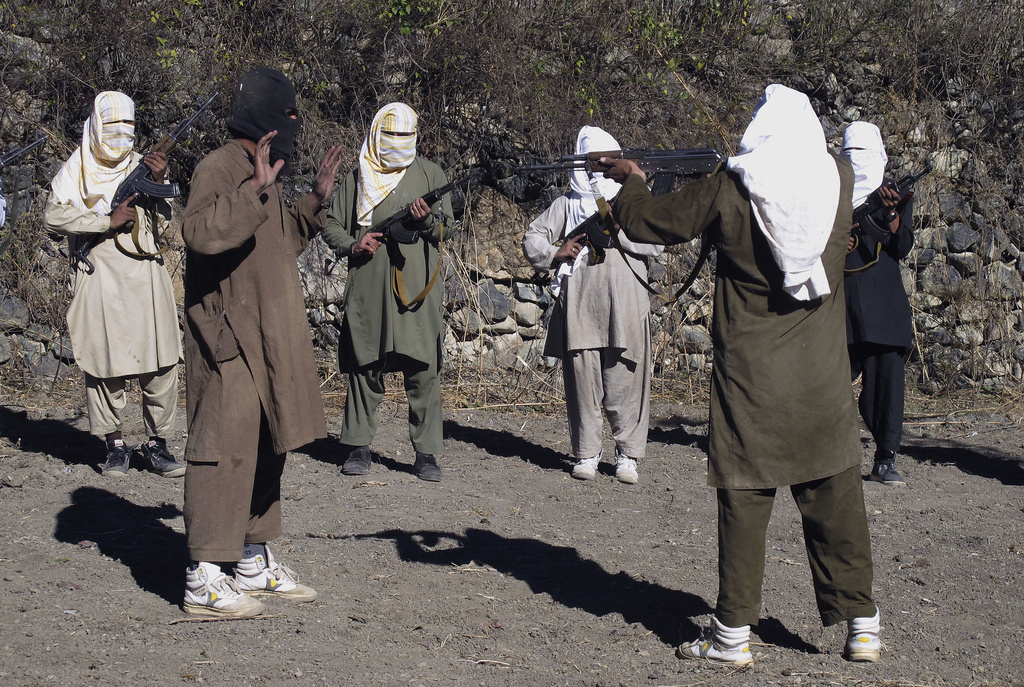
Swiss residents join jihad groups

Several Swiss residents last year travelled abroad to join jihadist terrorist groups, the Federal Intelligence Service (FIS) said on Tuesday, noting that an increase in jihad-motivated travel had been observed generally across Europe.
Releasing its annual report on Switzerland’s security situation, FIS said it was aware of several former Swiss residents who are currently in “a jihad area like Somalia or Afghanistan/Pakistan in order to take part in hostilities”.
However, the report said that while an increase in jihad-motivated travel movements had been observed across Europe – including in Switzerland – last year, the number of cases remained small, making it difficult to determine if there had been an increase in travel specifically from Switzerland.
FIS said the 2011 killing of Osama bin Laden and many core leaders of al-Qaeda “marked a milestone” in the global fight against terrorism which may have permanently weakened the organisation.
“Al-Qaeda affiliates, however, continue to develop particularly on the Arabian Peninsula, in the Horn of Africa and the Sahel region and now represent a significant threat to Western interests,” the report said.
At a press conference to release the report, Defence Minister Ueli Maurer said Switzerland needed to be better equipped to combat new threats to security. He said he would propose a law in the middle of the year to give intelligence services more power and resources, without specifying which areas would be targeted.
Arab Spring
Noting the impact of the Arab Spring, the Swiss intelligence service said that although the movement to depose autocratic regimes was supported by Switzerland, “at worst, instability, economic setbacks and violent confrontations will proliferate and possibly lead to new international interventions or lay the ground for new fundamentalist or authoritarian governments”.
FIS warned that the security of the Swiss community and diplomatic institutions in countries on the southern and eastern shores of the Mediterranean could be at risk.
“Risks of terrorism, and the outflow of weapons resulting from the destabilisation of countries, disruption of trade and energy supplies, handling of international sanctions, dealing with assets belonging to the ex-leaders, and migration from crisis areas to Europe have become increasingly significant problems,” the report said.
“Thus, there are considerable risks but also opportunities to encourage positive developments.”
Europe’s debt crisis
The FIS report also warned that Switzerland stood to be profoundly affected by the eurozone debt crisis, despite the cushioning effect the country’s solid financial situation gave it against economic consequences.
“The strong Swiss franc, the slowdown in economic growth and considerable uncertainties are clear proof of this. Stabilisation of the euro area is without doubt of crucial economic importance. In many domains – such as financial and fiscal policy but also with regard to traffic policy and security cooperation – the pressure on our country to adapt will remain high in general.”
FIS also noted that governments and intelligence services were increasingly relying on cyber-attacks to replace traditional activities.
It said that illegal intelligence services were “directly targeting Switzerland and its capacity to act, or aiming at securing competitive economic advantages or monitoring and putting pressure on their own citizens in Switzerland”.
It added: “Intensifying economic competition, political upheavals, shifting economic balance and technological revolutions require that greater attention be paid to all aspects of illegal intelligence.”
The Federal Intelligence Service is in charge of civilian intelligence operations and assesses threats against Switzerland situation.
The annual security report reviews the domestic security situation and also considers global situations that are continually monitored in light of potential threats to Switzerland, such as economic downturns.
The 2010 report does not take into account new threats arising from developments in North Africa since the start of 2011.
In presenting the report for 2010, Defence Minister Ueli Mauer said progress has been made in the destruction of personal data gathered illegally by the Intelligence Service.
The issue was criticised by a parliamentary commission in 2010. The report by a parliamentary watchdog showed that the secret services collected information about 200,000 suspects, mainly foreigners, considered a threat to the state.
The report said the internal secret service failed to observe correct legal procedures and neglected regular quality controls in breach of the law.
Data for 44,000 people still has to be dealt with. All data should be assessed by the end of 2012.

In compliance with the JTI standards
More: SWI swissinfo.ch certified by the Journalism Trust Initiative





























You can find an overview of ongoing debates with our journalists here . Please join us!
If you want to start a conversation about a topic raised in this article or want to report factual errors, email us at english@swissinfo.ch.